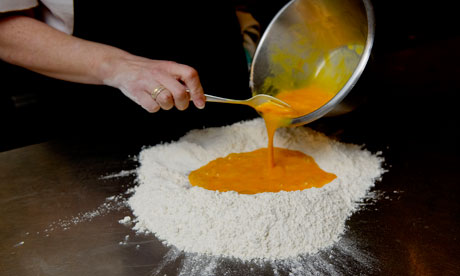
Advocating cannibalism, it turns out, can boost book sales. After it emerged in April that a misprint in The Pasta Bible urged readers to add "salt and freshly ground black people" to a recipe, sales of the Australian cookbook have almost quadrupled.
Last month a reader got in touch with Penguin Australia about the error in the cookbook's recipe for tagliatelle with sardines and prosciutto, which in substituting "people" for "pepper" forced the publisher to send the 7,000 copies of the book at its warehouse to be destroyed. But far from putting readers off The Pasta Bible, the Bookseller reveals that sales after the mistake came to light were up 275% on the previous fortnight.
The numbers sold are hardly going to trouble the Australian bestseller charts – the increase was from just 48 copies sold to 180 – but the Bookseller's Tom Tivnan pointed out that "bad news is often good news" when it comes to book sales, "particularly for a book like this, which hardly anyone would have come across before". "Anything that brings it above the pile of other pasta cook books is going to help its sales," he added.
The Bookseller pointed to other titles that have enjoyed an increase in sales following negative publicity: when it emerged that James Frey had fabricated parts of his memoir A Million Little Pieces, average weekly sales jumped from 489 copies to 1,494 copies sold, while the news that Kaavya Viswanathan had lifted passages from another writer's book for her debut novel How Opal Mehta Got Kissed, Got Wild, and Got a Life increased sales by 23% in 2006.

